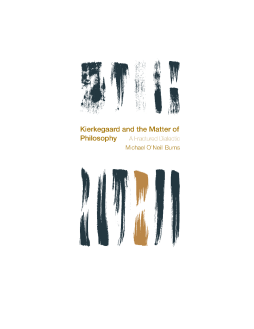
Additional Information
Book Details
Abstract
Søren Kierkegaard is often cast as the forefather of existentialism and an anti-Hegelian proponent of the single individual. Yet this book calls these traditional characterizations into question by arguing that Kierkegaard offers not only a systematic critique of idealist philosophy, but more surprisingly, a political ontology that is paradoxically at home in the context of twenty-first-century philosophical and political thought.
Through a close consideration of his authorship in the context of nineteenth-century German idealism, Michael O'Neill Burns argues that Kierkegaard develops an ontology, anthropology and theory of the political that are outcomes of his critical appropriation of the philosophical projects of Hegel, Schelling, and Fichte. While starting out in the philosophical concerns of the nineteenth century, the book offers an interpretation of Kierkegaard that shows his relevance to philosophers and political theorists in the twenty-first century.
Burns’ book is a seminal contribution to Kierkegaard scholarship. He convincingly shows against some widespread misconceptions that Kierkegaard’s thought implies a powerful contribution to ontology and to social and political thought. In addition to this novel approach to Kierkegaard, Burns defends the most relevant aspects of Kierkegaard in the context of contemporary philosophy. A very good book!
Markus Gabriel, Professor of Philosophy, University of Bonn
Michael O'Neill Burns is a visiting affiliate assistant professor in philosophy at Loyola University Maryland. He has published articles on Kierkegaard, German idealism and political philosophy.
Michael Burns, in his magisterial Kierkegaard and the Matter of Philosophy, achieves nothing less than doing for Kierkegaard what Slavoj Žižek has done for Hegel. While remaining faithful to core components of Kierkegaard’s philosophy, Burns sweeps aside accumulated received readings of him and constructs in their place the figure of a Kierkegaard deeply and undeniably relevant to today’s philosophical landscape as colored by innovative revivals of the legacies of German idealism and Marxism. Burns's transcendental materialist Kierkegaard promises fundamentally to transform our understandings both of the past two centuries of European philosophy as well as of contemporary Continental metaphysics.
Adrian Johnston, Professor and Chair, Department of Philosophy, University of New Mexico
“[I]t is excellently written, well sculpted, and […] makes Kierkegaard relevant in today’s philosophical landscape by offering contemporary philosophers a “materialist Kierkegaard” that goes beyond our traditional readings of one of the pillars of existentialism. [T]his book is a must read”
Burns presents us with a radical, political, materialist Kierkegaard. His argument is bold, counter-intuitive - and utterly persuasive. This book deserves to set the agenda for Kierkegaard studies for years to come.
Steven Shakespeare, Liverpool Hope University
